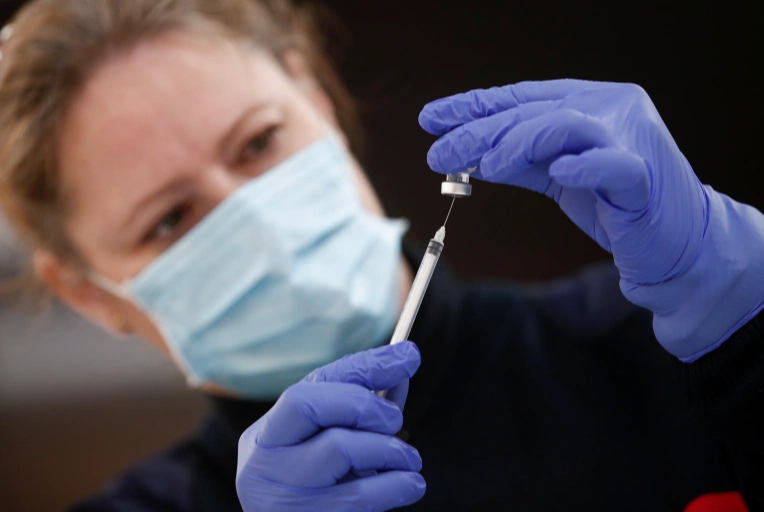
A worker fills a syringe with a Pfizer vaccine dose at the Disneyland Paris theme park. In France, 20.5 percent of the population has been vaccinated [File: Benoit Tessier/Reuters]
Paris, April 26 (RHC)-- More than one billion doses of COVID-19 vaccines have been administered worldwide, according to a tally, with more than half given in just three countries. A report show that one in four people in rich countries has been vaccinated, compared with one in every 500 in low-income nations.
At least 1,002,938,540 doses had been administered in 207 countries and territories by Saturday, less than five months after the first mass inoculation programs began to be rolled out, AFP news agency said, citing figures from official sources.
The milestone was reached as a daily record of more than 893,000 coronavirus infections cases were registered worldwide on Saturday, primarily due to an alarming surge of the virus in India. Fifty-eight percent of the vaccine doses have been administered in three countries: the United States with 225.6 million doses; China with 216.1 million doses; and India with 138.4 million.
However, in terms of the proportion of the population who have been vaccinated, Israel is in the lead, with nearly six out of every 10 Israelis fully inoculated. That is followed by the United Arab Emirates, where more than 51 percent of the population has received at least one jab; the United Kingdom, with 49 percent; the U.S., with 42 percent; Chile, with 41 percent; Bahrain, with 38 percent; and Uruguay, with 32 percent.
In the European Union, 128 million doses have been administered to 21 percent of the population. Malta is leading the way in the 27-nation bloc, with 47 percent of its population inoculated, followed by Hungary with 37 percent.
But in Germany, only 22.6 percent of the population has been vaccinated; 22.3 percent in Spain; 20.5 percent in France; and 19.9 percent in Italy. Worldwide, the number of shots administered has doubled in less than a month as vaccination campaigns pick up speed.
While the majority of poor countries have also started to vaccinate, mainly thanks to the COVAX program, inoculation is still largely a privilege of high-income countries, as defined by the World Bank, which are home to 16 percent of the world’s population but have administered 47 percent of vaccine doses. Low-income countries account for just 0.2 percent of doses administered, the United Nations said earlier this month.
Some 12 countries have yet to begin vaccinating – seven in Africa (Tanzania, Madagascar, Burkina Faso, Chad, Burundi, Central African Republic and Eritrea; three in Oceania (Vanuatu, Samoa and Kiribati; one in Asia (North Korea); and one in the Caribbean (Haiti).
“There remains a shocking imbalance in the global distribution of vaccines”, World Health Organization chief Tedros Adhanom Ghebreyesus told a news briefing in Geneva on April 9th. “On average in high-income countries, almost one in four people has received a vaccine. In low-income countries, it’s one in more than 500. Let me repeat that: one in four versus one in 500.”
More than 100 countries have called on the World Trade Organization (WTO) to temporarily waive patents for COVID-19 vaccines, saying they are being prevented from immunising their people. Some countries and activists have branded the access disparity a “vaccine apartheid” and urged the WTO to remove provisions in a trade agreement governing intellectual property rights so medical products can be more easily accessed by poorer nations.

